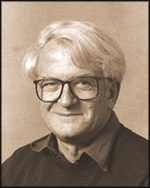
Ronaldo Ramirez 1934-2022: an Appreciation (Patrick Wakely)
Submitted by frankie on Wed, 2022-12-28 13:01.
Wakely 2022
The views expressed in 'Recent News & Reflections' are those of the author and do not necessarily reflect those of any of the governments, organisations or agencies with whom they have been working.
Ronaldo, a Senior Lecturer in The DPU for 32 years (1974-2006), passed away peacefully on 17 December 2022 at the age of 88.
He was born and brought up in his native Chile, where he studied architecture and urban planning. As a student he was an active member of the Communist Party (CP) of Chile. In the late 1950s, he led a Chilean delegation to a CP International Youth conference in the People’s Republic of China. After graduating from the University of Chile, he established an architectural practice in Santiago that worked mainly on the design of social housing, within the framework of a progressive national housing policy.
In the early 1970s, he enrolled in the Centre for Urban Studies, UCL, directed by the eminent urban sociologist, Professor Ruth Glass, from which he qualified with a UCL post-graduate diploma in Development Studies. On his return to Chile, he was appointed professor in the University of Chile.
Following the military coup d’état in 1973 that established the Military Junta dictatorship of Augusto Pinochet, there was no way in which Ronaldo, as a CP member, could remain safely in Chile. So, with help from close friends in London, he and his family left Chile and came to the UK.
In 1974 he was appointed a Lecturer in the DPU to teach on the Post-graduate Diploma course in Urban Development Planning (the only 12-month course, offered by the Unit, then). In the late 1970s, he and Louis Wassenhoven, another lecturer in the Unit, designed a curriculum and teaching & examination schedule for a MSc programme in ‘Urban Development Planning’ (UDP), embracing a series of specialist options (e.g. ‘Housing’; ‘Urban Economic Development’; etc), which Ronaldo presented to, and negotiated its approval by, the Academic Board of the University of London. (UCL did not have powers to establish or examine post-graduate degrees, then). In 1992, he re-designed the ‘Housing’ option of the UDP course as a separate MSc programme in ‘International Housing Studies’ and secured its academic approval and then directed until his retirement in 2004.
Ronaldo, also secured grant funding for major research projects that he undertook in collaboration with Jorge Fiori and others, notably: ‘Self-help Housing Provision in Latin America: the Case of Venezuela’ (1983-89); Urban ‘Poverty alleviation through environmental upgrading in Rio de Janeiro Favela Barrio Programme’; ‘Factors for Successful Community Initiatives at the barrio level: the Case of Cuba’ (2002-04). He was also commissioned to undertake studies for the United Nations UN-HABITAT and other international aid agencies in Africa and Asia.
Ronaldo was not only a creative researcher and an engaging and popular teacher and degree research supervisor. He was also an important political thinker. He introduced into the DPU the important 1970’s work of the Latin American left, highlighting its relevance to urban development planning and housing , beyond the dominant African and Asian influences at the time. In the early 1980’s as an extra-curricular activity Ronaldo ran an evening reading group on Marx’s ‘Capital’.
Following the 1973 right-wing coup in Chile, Judith Hart, Minister of Overseas Development in the British (Labour) government, authorized the entry of Chilean exiles to the UK, Ronaldo was an important stimulus for many amongst them to choose to study at the DPU.
Ronaldo Ramirez devoted his life in the UK to the DPU, with strong support from his wife, Ruth Weil, their daughter, Paulina, and son, Matias, both, economists with flourishing academic careers in British universities, of which Ronaldo was very proud.
His charm, wit and good humour will be badly missed by his many friends, colleagues and ex-students.

